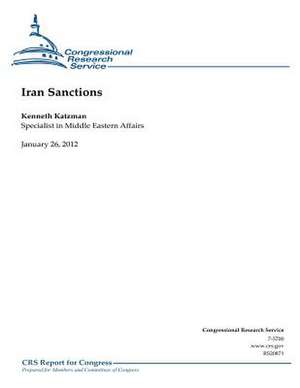Iran Sanctions
Autor Kenneth Katzman Contribuţii de Congressional Research Serviceen Limba Engleză Paperback
| Toate formatele și edițiile | Preț | Express |
|---|---|---|
| Paperback (4) | 91.47 lei 22-36 zile | |
| CREATESPACE – | 91.47 lei 22-36 zile | |
| CREATESPACE – | 92.34 lei 22-36 zile | |
| CreateSpace Independent Publishing Platform – | 102.54 lei 22-36 zile | |
| CREATESPACE – | 114.79 lei 22-36 zile |
Preț: 102.54 lei
Nou
Puncte Express: 154
Preț estimativ în valută:
19.63€ • 20.19$ • 16.29£
19.63€ • 20.19$ • 16.29£
Carte disponibilă
Livrare economică 27 ianuarie-10 februarie
Preluare comenzi: 021 569.72.76
Specificații
ISBN-13: 9781475278583
ISBN-10: 1475278586
Pagini: 80
Dimensiuni: 216 x 279 x 5 mm
Greutate: 0.21 kg
Editura: CreateSpace Independent Publishing Platform
ISBN-10: 1475278586
Pagini: 80
Dimensiuni: 216 x 279 x 5 mm
Greutate: 0.21 kg
Editura: CreateSpace Independent Publishing Platform
